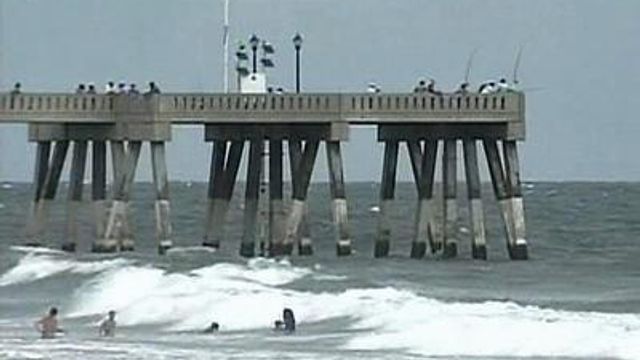Hurricane experience guides storm preparation
Experience should teach North Carolinians that hurricanes can reach far inland, even to the Triangle. But many are complacent about that threat, state and non profit officials say.
Posted — UpdatedThis year, North Carolina has already had a brush with one named storm, but Tropical Storm Cristobal barely whipped up strong waves and heavy rain before heading back over the Atlantic.
Hurricane season 2008, though, still threatens the state: The National Oceanic and Atmospheric Administration predicts 12 to 16 named storms, including six to nine hurricanes and two to five major major storms.
"We learn from each event," said Bryan Beatty, secretary of the North Carolina Department of Crime Control and Public Safety. "And it's important each year, we look at what we've done."
Nearly three years have passed since a major hurricane punched North Carolina's coast: In September 2005, Hurricane Ophelia washed out roads and flooded homes in five counties, causing more than $35 million in damage.
The state did not escaped unscathed the next year, when remnants of Tropical Storm Alberto left many people in the Triangle underwater and Crabtree Creek saw its second-highest crest ever in June 2006.
Alberto raised memories of Hurricane Fran, which toppled trees and caused flooding across the state in September 1996. An oak pierced the roof of Elizabeth and Jerome Perry's home along Raleigh's tree-lined Eton Road.
"I'll never forget it. It was a crashing sound, a huge crashing sound," Elizabeth Perry said.
"I think you realize how vulnerable you are," Jerome Perry said.
Beatty said after watching Hurricane Katrina ravage New Orleans in 2005, North Carolina implemented a more comprehensive coastal evacuation plan. The state also worked to improve communication between response agencies and get more swift-water rescue teams at the ready.
Still, the state still faces challenges, nonprofit officials say. The downturn in the economy has particularly hurt relief organizations, officials said.
"If a Katrina were to happen, it's going to overwhelm the resources of the state and the voluntary organizations," Barry Porter, executive director of the Triangle Red Cross, said.
Nonprofit relief agencies must prepare a long time before a storm strikes, but often struggle to get the public's support without an immediate motivation, Porter said.
"Often people will help us when a disaster occurs," Porter said. "But for us, it's a challenge of building an awareness that the ability to respond is predicated on using funds prior to an event."
While the state is well prepared for a hurricane, many individuals are complacency about the possibility, Beatty said, particularly those state's influx of new residents without years of hurricane experience.
"Our biggest concern right now is making sure that individuals and families understand their responsibilities," Beatty said.
The Perrys said they learned about those responsibilities after going without power for eight days after Fran. They keep a chainsaw, portable stove, canned food, flashlight and fire extinguisher close by.
"The weather is something I check every morning," Elizabeth Perry said.
"Until you experience something like that, you don't think it's going to happen to you," Jerome Perry said. "And so, I think it changes your perspective. You realize how much damage it can do."
• Credits
Copyright 2024 by Capitol Broadcasting Company. All rights reserved. This material may not be published, broadcast, rewritten or redistributed.





